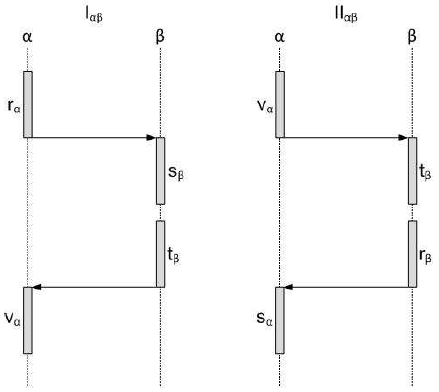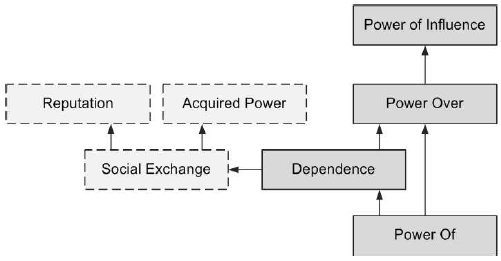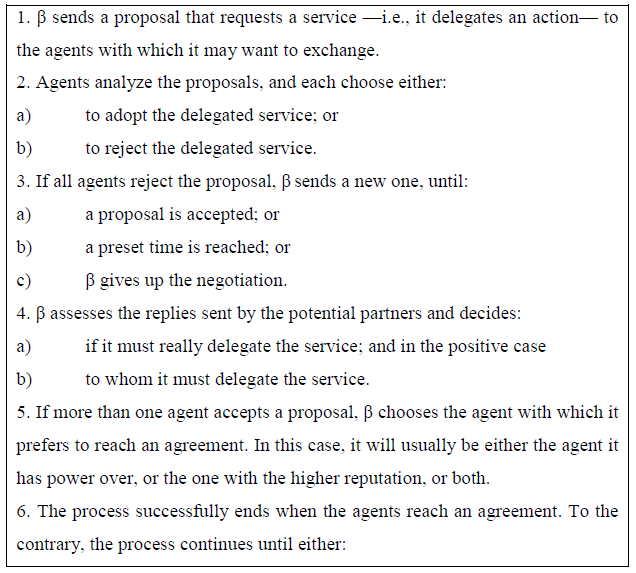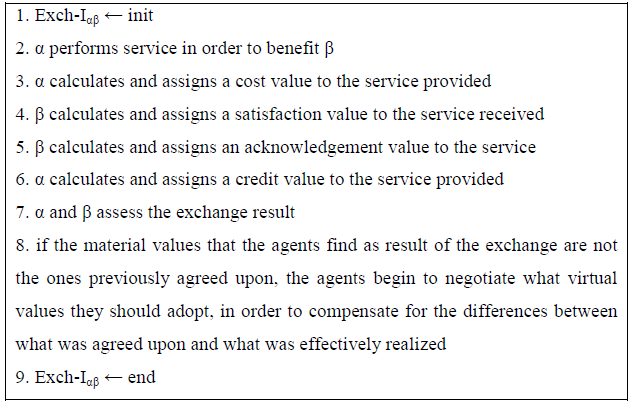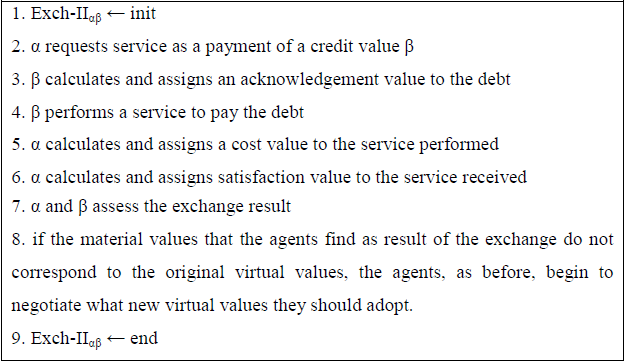INTRODUCTION
Castelfranchi (2003) states as a fundamental fact of social life that individuals depend on each other to achieve their goals. In consequence, such dependence relations among individuals make some of them have power over the actions of others. In this way the lack of power of one individual implies the power of others.
An increasing number of computational systems have appeared in relation to interactions between autonomous agents. These agents have abilities to decide: i) which objectives to adopt; ii) which actions must be performed to reach particular objectives; and iii) when they must be performed.
In Multi-Agent Systems, agents frequently have different objectives to achieve. However, they are not always able to carry out a particular action to achieve their objectives. Thus, negotiation plays a fundamental role in interactions among artificial agents ( Rosenschein and Zlotkin 1994 ). It enables agents —or groups of agents— to reach an agreement regarding some of their mental actions —i.e., beliefs, goals or plans—, and thus to manage the interdependences among agents.
Concerning social interactions, we adopt Piaget’s theory of social relations ( Piaget 1995 ), which follows the so-called social exchange approach: an interaction is an exchange of services between agents, such that the agents assign values, called exchange values, to the actions and objects they exchange during the interaction.
Exchange values often have an important function in interactions and in social systems in general. They serve as a regulation mechanism that the set of agents can use in an effort to guarantee the stability of their social interactions. Exchange values can also be used in the agents’ processes of social reasoning, helping them to select better partners for their interactions.
Several forms of social influence affect agents’ actions within a society. In this paper, we want to show how some social aspects related to social power are considered in agents’ reasoning, and how they can influence agents’ actions.
This paper is organized as follows: The theory of exchange values is presented in Section 1. Section 2 presents agents’ social power. Social exchange between agents is presented in Section 3. Section 4 presents the results obtained in the simulations. Section 5 is about related works. And conclusions are presented in Section 6.
THEORY OF EXCHANGE VALUES
The theory of exchange values ( Piaget 1995 ) studies and formalizes the dynamics of social interactions as constituting a system of exchanges of services between individuals. All services that individuals perform for others, or which they receive from others, constitute values for them, either costs or benefits. These values can generate debts —e.g., obligations to perform new services in compensation for previously received services— and credits —e.g., rights to demand the realization of a new service in compensation for services previously executed.
Exchanges can thus be understood from two different points of view. On the one hand, exchanges are related to the goals of individuals and/or society as a whole. On the other hand, exchanges involve investments, benefits and profits through many different kinds of elements —e.g., time, money, emotions, etc.— not all amenable to a quantitative evaluation.
For each of these points of view, it is possible to assign a different type of value, resulting from an evaluation of the exchange: final values or performance values. Final values —or goal values— are associated with exchanges representing their contribution to the accomplishment of the objectives established by individuals and/or society. Performance values are assigned to exchanges in order to represent the variations in their motivational and affective aspects.
In the latter case, a value is the result of a qualitative mental evaluation of the elements involved in interactions —e.g., actions, emotions, objectives, etc.—. Each resultant value is mentally associated with one of these elements, and its assessment may, therefore, influence an individual’s behavior in relation to the interactions.
According to Piaget (1995) , complete exchanges occurring between individuals involve two types of stages. We summarize this definition in Figure 1 , where α and β are two agents, and the two types of exchange stages (Iαβ and IIαβ) are shown. Each stage consists of four steps:
Stage Iαβ:
α performs a service on behalf of β and associates with this action an investment —or renouncement— value rαβ;
β recognizes his/her satisfaction with the received action and associates with this action a satisfaction value sβα;
β acknowledges the value of the received action by acknowledging the debt value tβα;
α feels (personally or socially) valued with the realization of the service (and, possibly, with the acknowledgment from β) and associates with this service a credit value vαβ.
Stage IIαβ:
α requests that β performs a return action on behalf of α, based on the credit vαβ it has in relation to β;
β acknowledges the debt tβαsub>;
β performs a service with an investment value rβαsub>;
α acknowledges his/her satisfaction sαβsub> with the service performed by β.
In stage Iαβ individual α performs a service in benefit of another individual β and is valued by the accomplishment of this service —e.g., acquiring a credit for the action—; and in stage IIαβ the credit accumulated by α confers the right to request a service from β in return for the service performed previously.
During the sequence of events in the two kinds of exchange stages, the exchange values accumulated by the individuals experience positive or negative variations. If the equilibrium —sum total— of the variations during a certain exchange is null, the exchange is considered to be in equilibrium ( Ribeiro et al. 2003 ).
Piaget (1995) observes that situations in disequilibrium can occur during an exchange, and for various reasons. One example is when the investment of α is greater than the satisfaction of β (rαβ > sβα), and another is when β does not recognize the full value of the work performed by α (tβα < rαβ) (see Dimuro et al. 2005 , Costa 2003 , and Ribeiro et al. 2003 , for further details).
The values involved in an exchange process are classified as two types: material values —values resulting from the evaluation of the real actions occurring during the interaction, and virtual values— values corresponding to debits and credits that are to be turned into material values in future interactions. The material values occur at moments (i) and (ii) in Iαβ, (iii) and (iv) in IIαβ, while the virtual values occur at moments (iii) and in Iαβ, (i) and (ii) in IIαβ.
We note that exchange values are not a type of utility value: they do not serve the purpose of helping to choose between two alternative actions yet to be performed. They may be used in such a way (see, for example, Ribeiro and Luck 2006 ), but that is not their basic purpose. Material values, for instance, only register the costs and benefits of services that were already performed, and that were chosen to be performed for whatever reason. Virtual values, although referring to future services, also only register the costs and benefits that such services must have when and if performed, but they do not serve the purpose of helping agents decide which of the various services should effectively be performed. The utility values that may help in making decisions as to whether or not a service will be performed may take exchange values —or, better, their balances— into account, but are clearly of a different nature then the exchange values themselves.
AGENTS’ SOCIAL POWER
There are many works that investigate and apply concepts related to power in artificial societies, for example: Lorine et al. (2007) , Fasli (2006) , Coelho (2006) and Caldas and Coelho (2000) .
We follow the concepts proposed by Castelfranchi (2003) , indicating that the power of relation shows the individual’s ability to perform certain actions. On the other hand, the power over relation is related to dependence relations that take place among individuals. This means that within a society, individuals depend on each other to reach their private goals. For example, agent α depends on agent β to reach its goal, if β has the power of performing the necessary actions, and α does not. In this circumstance, β has power over α’s goal.
In the current paper, for simulation purposes, the power of and power over relations are randomly assigned to agents. Depending on the agents’ interactions, their «abilities» and «dependence relations» can also be modified. The dependence relations and the agents’ abilities help in making decisions regarding the adoption or delegation of actions. The power over relation comes from some dependence relation or from an «acquired dependence» —e.g., an acquired debt—. It is named acquired power. Such aspects affect agents’ decisions within society. Decisions regarding the following items are affected ( Franco 2008 ):
When making decisions, agents should take into account ( Franco 2008 ): i) the power they have over their future partners’ actions, ii) the power their future partners have over their actions, and iii) existing current dependence relations:
An agent α delegates an action actx to other agent β if: α is not able to perform the action (i.e., α does not have the power of – ability to perform the action) and β can perform that action (i.e., β has the power of) or if the cost of delegating an action is lower than the cost of performing it (i.e., an acquired debt is less costly to perform).
An agent β adopts an action actx of another agent α if: there is a reciprocal dependence relation between agents, or if agent β owes a debt to agent α. In such case, α has an acquired power because it provided a service that benefited β.
Information about the agents’ «reputation» within society warrants safety to interactions. It prevents agents from interacting with other agents that have a bad reputation, thus avoiding risks in the exchange of services. The experience of previous interactions —i.e., information regarding reputation— is an indicator of future performance. It is thus possible to identify malicious partners and avoid them (see Avegliano et al. 2008 , and Conte et al. 1998 , for further details).
An agent’s reputation is based on the “confidence level” assigned to the agent. The confidence level depends on results obtained in past exchanges ( Franco et al. 2008 ). In other words, confidence is obtained through exchange values (see Figure 2 ). An agent’s reputation is calculated by adding up the results obtained from social exchanges:
When there is no exchange among agents, but there is a dependence relation among them:
Thus, within a society the agent’s reputation is a form of power, as reputation reflects the confidence level of an agent within a society. Our definition may be viewed as a complement to the one adopted by Castelfranchi (2003) .
SOCIAL EXCHANGE BETWEEN AGENTS
The first thing agents must do, when they are engaging in an interaction, is to reach an agreement regarding the services that will be exchanged. This process may take place as described below (see Figure 3):
The negotiation process begins with an agent submitting a proposal that calls for the implementation of a service - the agent with whom he would like to perform an exchange of service.
The social exchange —or exchange of service— takes place between two agents that have established an agreement between them, namely, the agent that requested the service —that delegated the service, the client agent— and the agent that will perform the service —that adopted the delegated service, the server agent.
The exchanges, formalized according to Piaget’s exchange model (1995), may take place in two phases, as described in Figures 4 and 5 .
AGENTS’ ATTITUDES
In this work, we assume that agents also show different attitudes during the interactions. When agents are calculating the values —material and virtual— that will be assigned to services, they can present one of the following attitudes ( Franco and Costa 2007 ):
an egoist agent is always searching for its own benefit —an egoist agent that receives a service calculates an acknowledgement value lower than the value that the service actually represents—;
an altruist agent is always looking for the benefit of another agent —an altruist receiver agent assigns an acknowledgment value higher than the value that the service represents, causing a benefit for the service performer agent—; and
a realistic agent assigns an acknowledgement value that is fair in relation to the benefits that the performed service actually caused.
We believe that knowing about attitudes is something basic in order to understand the actions that agents perform and the relations among agents during interactions ( Franco et al. 2008 ).
SERVICE MODEL
We have drawn from Almquist (1992) as the basis for the service model that supports the service assessment task. We considered the QoS model —Quality of Service—. Thus, a service is «an action» performed by an agent ( Franco and Costa 2007 ).
Services are classified in three classes: i) gold —high importance, ii) silver —average importance, and iii) bronze —low importance. Each service class has attributes and parameters. Attributes are: maximum, medium and minimum. The main parameters are the following: time —time an agent spent to perform a service, and quality —if the requested service was totally accomplished.
Scale of Values
In this work, each agent has a «scale of values» ( Piaget 1995 ). Service assessment is performed through this scale of values. The scale has a «qualitative» nature and is composed of a set of elements. Such elements are fundamental for the agents to calculate values that will be assigned to services, specifically: i) QoS aspects that will be assessed, i.e., service class, time and quality; ii) values assigned to QoS aspects, i.e., maximum = 3, average = 2 and minimum = 1; and iii) weights assigned to each aspect (0 to 10).
We presumed that agents use the same scale of values to calculate values that will be assigned to services. However, the importance, translated as weight, given the factors, is subjective. In this case, each agent assesses factors in a different way, using different weights. Weights assigned depend on the attitudes adopted by the agent. Thus, values involved in exchanges express subjective assessments. The final value of service (performed or received) is provided by the assessment Equation 1:
In this paper, the weights assigned to factors considered in Equation 1 are generated randomly and depend on the attitudes adopted by agents. Table 1 presents the weights that agents can assign.
Agents assign values to services according to: i) results of calculations performed through their ways of assessing services, and ii) attitudes they have adopted.
VERIFYING EQUILIBRIUM
The conditions for an equilibrated exchange are formalized as follows ( Piaget 1995 ):
Iαβ : (rαβ = sβα) Λ (sβα = tβα) Λ (tβα = vαβ) Λ (vαβ = rαβ)
IIαβ : (vαβ = tβα) Λ (tβα = rβα) Λ (rβα = sαβ) Λ (sαβ = vαβ)
It is fundamental that the credit value acquired for α (vαβ) in stage Iαβ is in equilibrium with the credit value charged for α (vαβ) in stage IIαβ.
If the group is in disequilibrium, the injured agents may not want to exchange services with their usual partners anymore, and may begin to look for new partners, thus raising risks for the group’s integrity.
SIMULATION
The scenario used in this paper was of Garbage Collector Robots in Mars. Through the simulation that follows we intend to show how social power is considered in agents’ reasoning, and how social power and exchange values can influence the actions of agents in choosing future partners.
In this scenario, ten (10) experiments were conducted, and each experiment consisted of one hundred (100) interactions. In all experiments the scenario presented the following characteristics:
The environment is composed of two types of agents: client agent (β –robot that delegates the action) and server agent (α -robot that adopts the action);
The planet’s territory is represented by a grid of dimensions (10x10);
In each new stage of exchange of service, ten (10) pieces of garbage are randomly distributed in the planet’s territory;
The initial beliefs of the agents are about their positions, and that the task of agent α will be: to verify the various points of territory, searching for garbage. In all experiments, the position of agent α is (0,0) and of agent β is (5,5);
α is requested to collect garbage, it searches for garbage deposited on the planet’s ground, and when any piece of garbage is found, it collects the garbage and carries it to the place where the requesting client robot is located. It leaves the garbage there and returns to the place where the garbage was found to continue its search. Agent β is positioned beside an incinerator, where all garbage delivered by α is located;
For each piece of garbage found, α may fail to collect it. This is going to happen if the agent fails to collect the garbage in a sequence of three attempts. In this case, α is going to follow its search —to the next position of the territory— and not collect the piece of garbage found.
EXPERIMENT RESULTS
Below are the steps obtained in the results from one of the experiments performed in the simulations:
1. Agents are inserted in the environment
Agent ID: 1
Agent ID: 2
Agent ID: 3
Agent ID: 4
Agent ID: 5
In the instant that agents are introduced into the environment, their dependence relations —power over— and abilities —power of— are also created. These values, initially, are generated randomly. Depending on the interactions of agents, their abilities and dependence relations can be modified.
2. Generation of dependence relations set…
Dep+ ID: 1 and ID: 5
Dep+ ID: 2 and ID: 5
Dep+ ID: 2 and ID: 1
Dep+ ID: 2 and ID: 3
Dep+ ID: 3 and ID: 4
Dep+ ID: 3 and ID: 1
Dep+ ID: 4 and ID: 3
Dep+ ID: 4 and ID: 5
Dep+ ID: 5 and ID: 4
3. Starting Interaction 1
Client ID: 4
Future partners ID: 5 and ID: 3
In step 4 agents ID: 4 and ID: 5 established an agreement and the negotiation process was finished. The agents perform the negotiation process through the protocol presented in Figure 3 , Section 3. The agents decide to reach agreements with agents they have power over and that have good reputations.
4. Established an agreement...
Agent ID: 4 sends (collect-garbage) for agent ID: 5 Agent ID: 5 has capabilities collect-garbage
Agent ID: 5 has commitment with agent ID: 4
Agent ID: 5 has reciprocal dependence with agent ID: 4 Agent ID: 5 sends (agreement-settled) for agent: ID: 4 Agent ID: 4 sends (agreement-settled) for agent: ID: 5
After the negotiation process is finished, agents perform the stage of exchange of service —social exchange—. In this stage, agent ID: 5 searches for garbage deposited on the planet’s ground, and when any piece of garbage is found, it collects the garbage and carries it to the place where the client agent is. After agent ID: 5 collected garbage, the agents calculated the values —material and virtual— to be assigned to services. At the end of each stage of exchange, the agents can verify whether the exchange occurred in an equilibrated way. During the exchange of services, the agents interact through protocols presented in Figure 4 and 5 , Section 3.
5. Exchange of service
Client ID: 4
Server ID: 5
AGENTS’ ATTITUDES
Server: REALISTIC
Client: ALTRUIST
In this case, agent ID: 5 collected all the pieces of garbage found in the territory. We used a margin of tolerance of 0.3 between the exchange values calculated by agents.
Cleaning territory...
Collected garbage position: (7,0)
Collected garbage position: (2,1)
Collected garbage position: (3,1)
Collected garbage position: (7,3)
Collected garbage position: (5,3)
Collected garbage position: (5,4)
Collected garbage position: (7,4)
Collected garbage position: (2,6)
Collected garbage position: (9,9)
Collected garbage position: (1,9)
Failures: 9, Collected: 10, End of territory: YES
After the stage of exchange of service is finished, the agents evaluate the
services. Agents assign exchange values to services according to: i) results of
calculations performed through their ways of assessing the services (
In this case, agents assign values considering the following criteria:
6. Evaluation of Service...
Server: 1.87
Client: 1.6
Result: EQUILIBRATED
Updates Beliefs
After each interaction, agents’ beliefs are updated. Thus, not only information related to dependence relations and abilities influence agents’ decisions, but also the partners’ reputations.
In interaction 1, agent ID: 5 acquired credit in relation to agent ID: 4, thus, agent ID: 4 is committed to agent ID: 5.
Through the results obtained, we can conclude that the decisions of the agents, when influenced by characteristics related to social power, influence the results of interactions. The model supports the agents in group formation, allowing them to decide to whom they delegate services and who adopts the services. This feature allows agents to choose their future partners.
The model provides the means to formalize the social commitment, allowing agents to verify which partners met the commitments made during interactions.
The exchange values are seen as performance values and serve as instruments for the continuity of interaction, in that debts and credits acquired by agents are seen as social commitments. Exchange values are thus viewed as motivators and regulators of social interactions. The formation of cooperation and exchange values was considered in the model, allowing agents to establish and to regulate social interactions.
The formalization presented in this paper can be exploited in different areas, for example:
Social Simulation: formalization can be viewed as tools that help in the understanding of various social aspects. In this case, they can simulate the behavior of social agents in relation to social power and reputation. Thus, different results can be observed through combinations of different features.
Collaborative Systems: formalization provides tools that help agents in choosing partners, thus contributing to group formation.
Games: simulate different strategies according to characteristics adopted by agents. Formalization can also help agents in group formation (of teams) in accordance with the ability presented.
RELATED WORK
This section presents some of the works that have investigated the application of the theory of exchange values ( Piaget 1995 ).
In Costa and Dimuro (2002) , the authors present a normative formal structure for computing systems. The structure is constructed on the basis of the theory of exchange values. The authors identify the social exchanges with services exchanged between agents in computational environments. The structure allows agents in the system to analyze and to interpret, in terms of values and rules, the exchanges occurring between agents.
Ribeiro et al. (2003) is based on the normative formal structure presented in Costa and Dimuro (2002) . In this work, the authors present a system of exchange values for modeling social exchanges in multiagents systems. The system is composed of an algebra of exchange values, a social reasoning mechanism based on the concepts of the theory of exchange values, and structures that allow for storing and manipulating values. The authors integrate the Contract Net model and the model based on Dependences ( David et al. 2001 ) into their system. The system makes it possible to model interactions between agents, since it captures moral aspects of interactions.
In Dimuro et al. (2005) , the authors introduce the concept of the equilibrium supervisor. The supervisor is an agent responsible for the regulation of exchange values. The supervisor’s decision process is based on the Markov Decision Process. The supervisor supplies recommendations for the values to be associated with exchanges with other agents, in a manner in which the system maintains its equilibrium/disequilibrium, according to societies’ norms. The agents can choose whether or not to follow its recommendations, but the authors tell them that in order for the system to maintain its equilibrium, it is necessary that agents obey the supervisor’s recommendations.
In Ribeiro and Luck (2006) , the authors present a computational approach for modeling autonomous cooperative interactions. In this work, exchange values motivate agent interactions and their maintenance through a system of credits and debts. The authors argue that, by analyzing the equilibrium of exchange values in past interactions, autonomous agents can identify situations in which cooperation with other agents is unsuccessful and decide whether or not to maintain such cooperation.
CONCLUSION
In the present paper, exchange values, as well as social power, are taken into account in agents’ ways of reasoning, thus affecting agents’ behavior. Multi-Agents Systems research based on Social Sciences is more realistic in its modeling of agents’ behavior, as it tries to model influences of social aspects in agents’ decision processes.
The model supplies a social regulation tool that allows agents to verify whether social exchanges occurred in an equilibrated way. Thus, if the results of interactions are not in line with their expectations, agents can choose new partners for future interactions —allowing agents to choose the social group with which they will interact and who will be their future partners.
The characteristics related to the social power of agents have a strong influence on group formation —choice of partners— because agents’ strategies for delegation and adoption are influenced by information on dependencies between agents and their abilities.











 nueva página del texto (beta)
nueva página del texto (beta)

